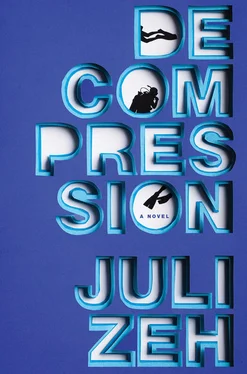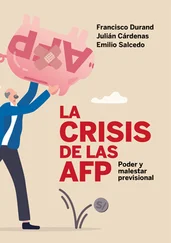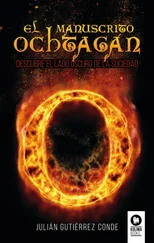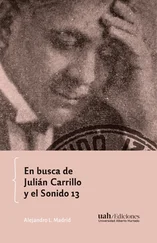I called up Bernie. Countless times. At first he hung up, and then he refused to take my calls. When he was finally ready to talk to me, I asked him why he’d backed out of the expedition the night before it was supposed to take place. He told me that as far as he was concerned, I was the one who’d backed out. He said he got a text message from me informing him that I still needed the boat but not the crew, and that I wanted to go on my expedition with Jola and Theo instead. Right away, Bernie said, that had seemed to him like an idea conceived by a madman.
A text from my phone, just as described in Jola’s diary. I found the message in my “Sent” box. She’d mimicked my bad English so well that I wondered for a moment whether I’d written the text myself. On the Dorset , Jola had sat next to me the whole time. Practically on my lap. Of course she’d had access to my telephone. I couldn’t help admiring her ingenuity. It’s said that hostages identify with their captors as a way of coping with their own situation. Maybe believing that Jola’s brilliant is the only way for me to bear the unbearable.
I’ve tried to feel sorry for her. If only a small part of what she says about Theo’s excesses is true, she’s lived through hell on earth. A defense lawyer would say that a woman who’s been brutally and systematically abused over a long period of time finds herself in a permanent state of psychological emergency. He’d arouse the compassion of judge and jury and plead for their recognition of extenuating circumstances. But Jola doesn’t need any extenuating circumstances. She’s not the accused. I don’t feel like pitying her. Nor can I manage to hate her, even though she was prepared to put me behind bars for the rest of my life. Loving her for that would certainly be absurd. Maybe fascination is what you’ve got left when you don’t know how you should feel.
Did she arrive on the island with her plan already formed? Or did she come up with it only after she got here? If so, when? Was it some kind of game at first, and then at a certain point it turned serious? Did Theo’s behavior on the Dorset finally tip the balance? Or was it my refusal to have sex with her by the beach in Mala that got everything rolling? Looking for answers, I’ve read her diary so many times I know some passages by heart.

On Saturday morning, I lined up the van, went over to the Casa, and picked up the two suitcases. I left in good time for the return flight to Berlin that Jola and Theo had booked. Their tickets and identification documents were in my shirt pocket. It was as though I was driving ghosts to the airport. When I passed the spray-painted EVERYTHING IS WILL, I turned my head to the right. The passenger seats were actually empty.
I thought about the past Wednesday, the day of the murder attempt, about how I’d driven the same stretch of road on the way to the hospital. I’d brought the Aberdeen back to her anchorage as quickly as I could and forced myself to off-load at least the most expensive pieces of my equipment. After tearing across the island like a mental case, I was made to wait at the hospital reception desk. Half an eternity had to pass before the hospital was able to confirm that one Theodor Hast had been admitted more than two hours previously. When asked whether I was a relative of the patient, I stupidly answered, “No.” Nobody could tell me anything about his condition. No physician was available for me to talk to. Whether one Jolante von der Pahlen was present in the hospital could not be determined. In any case, no patient with that name had been admitted. When I tried Jola’s number, I got a dial tone. She was refusing my calls. Before long, her cell phone was turned off. There was no reception on Theo’s phone either.
People wearing robes and slippers meandered through the lobby, eyeing me curiously. Every thirty minutes, I went back to the reception desk and repeated my questions about Theo’s condition. Always with the same result: no further details were available, and I couldn’t be allowed upstairs. I could only wait for Frau von der Pahlen to come down to the lobby, perhaps to get a drink from the coffee machine, as many patients’ relatives did. Then, I was told, I could talk to her.
Darkness fell. The woman at the reception desk was relieved by a doorman, who produced a thermos bottle and switched on a little television set. I got some coffee from the coffee machine. The lobby was empty. It was very quiet. I gazed at the tall glass walls and through them at palm trees and cactuses and behind those the twinkling lights of the island’s capital city, and I felt a strange peacefulness. Above me, people were sleeping, some of whom didn’t know whether they’d survive the night. I stretched out on the bench. My leaden weariness almost felt good.
When I awoke, a young nurse was sitting in the doorman’s place. The TV was off, the thermos bottle had vanished. Dawn was breaking outside. When I requested information about Theo, the girl immediately reached for the telephone, asked questions, and listened to the answers, which poured out of the receiver in a stream of high-speed Spanish. After she hung up, she explained to me in English that Theodor Hast had already been transferred to the central hospital on the neighboring island; the transfer had taken place the previous evening. As far as she understood, Theo would undergo a few final tests and then take a direct flight back to Germany from the airport on the other island, probably in the course of that very afternoon.
I thanked her and drove home. I figured Theo’s condition must be at least stable. Getting his head cracked open, half drowning, and then spending an hour in cold water — that was enough for circulatory collapse and severe hypothermia. In that condition, you could die if you didn’t get help. But Theo had been helped, he’d turned the corner, and he’d be back on his feet soon. In Germany. Only when I was driving their luggage to the airport did I completely grasp the fact that I’d never see Theo and Jola again, that they’d literally vanished into thin air.
The woman working the check-in counter hesitated a long time and kept asking me to repeat what had happened. A diving accident. Air ambulance back to Germany. She compared the names on the tickets with those on the identity documents several times. Finally she nodded. She promised that the baggage would be delivered to the Berlin address. We put the tickets and papers in the document pockets of the two suitcases. I watched them bump along the conveyor belt and disappear through a rubber curtain into the belly of the airport.
That evening I sat on the terrace with a bottle of wine and read Jola’s diary straight through. In the end, I knew the meaning of fear. I lay awake in bed for hours, waiting for the roar of engines and the slamming of car doors and the voices of broad-shouldered Spaniards, informing me that I was under arrest for the attempted murder of Theo Hast. At last, in the early morning hours, it occurred to me that three days had already passed and nobody had come to my house.
Around noon I drove back to the airport to pick up my new clients. Not out of a sense of duty, but because I had no earthly idea what else to do with myself. While we were still in the van, I informed Nancy and Martin that my assistant, who normally helped me run the diving school, had suddenly been taken ill, and that therefore there would probably be organizational issues. Nancy and Martin looked unperturbed by this warning. Like most tourists, they were in a holiday mood, and it didn’t seem to them that anything in the world could spoil their diving enjoyment. They found the Casa Raya enchanting.
Читать дальше













